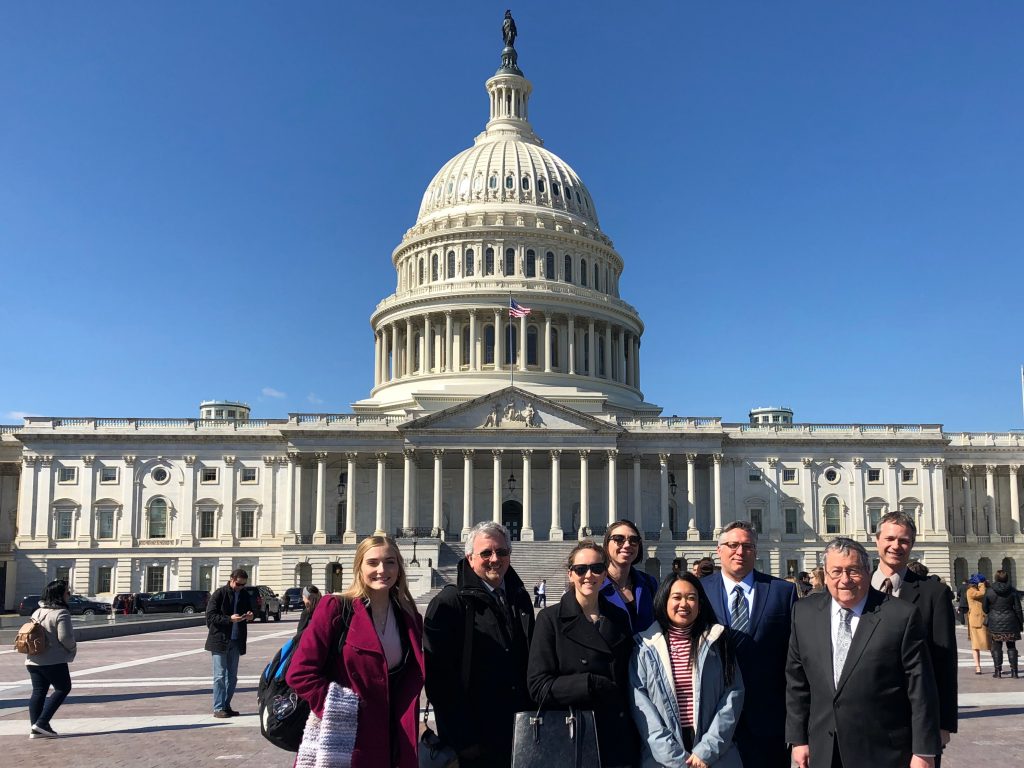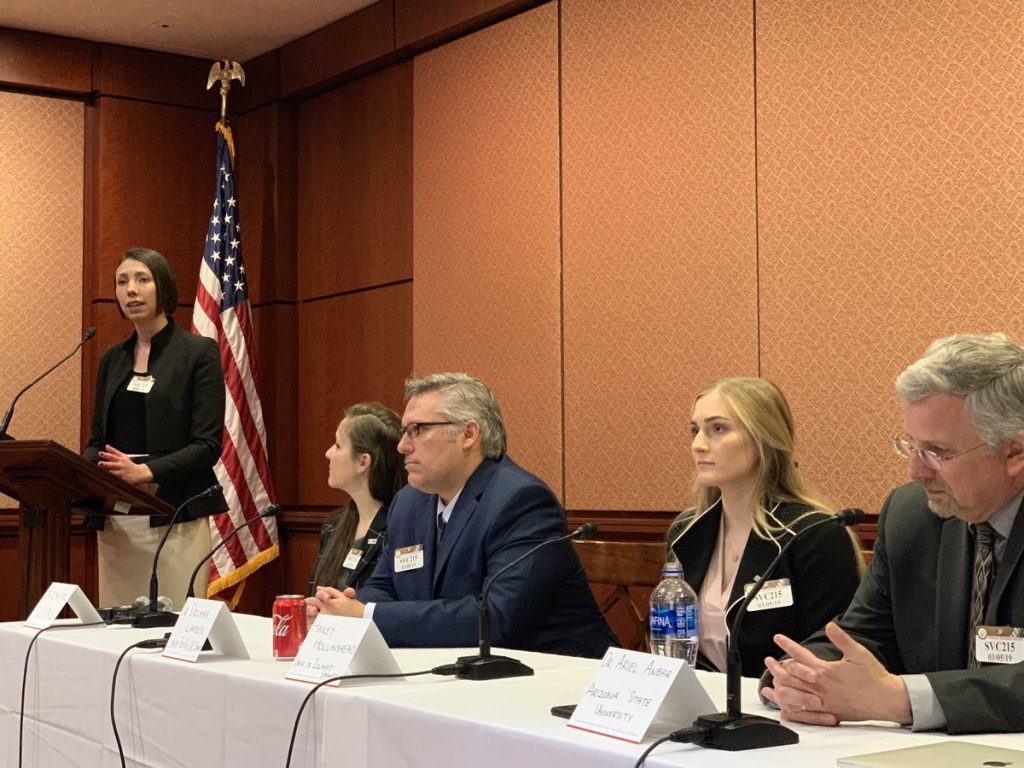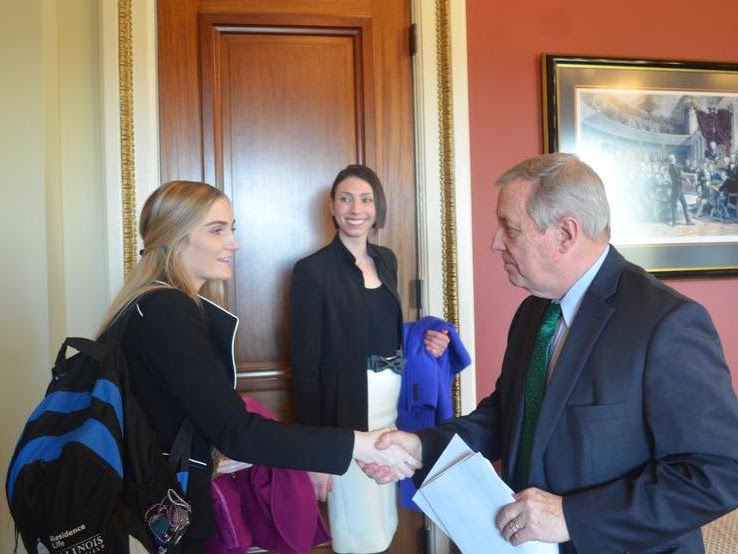In celebration of international Open Education Week, SPARC teamed up on March 5th with a group of open education advocates for a day of meetings on Capitol Hill to educate lawmakers about how open textbooks can make higher education more affordable and effective for students. Our action-packed day on the Hill involved a panel briefing for Congressional staff, a meeting with long-time open textbook champion U.S. Senator Dick Durbin (D-IL), and conversations with key offices on both sides of the aisle to renew and strengthen Open Textbook Pilot funding and pass the Affordable College Textbook Act.
 Open education advocates by the U.S. Capitol on March 5, 2019.
Open education advocates by the U.S. Capitol on March 5, 2019.Congressional Briefing
SPARC and U.S. PIRG co-hosted a briefing for Congressional staff on the latest developments on open textbooks. Speaking to a packed room in the Capitol building, the panel featured open education experts, students, and the leads of Open Textbook Pilot grant projects. The discussion covered a range of perspectives about how open textbooks are making a difference for students.
Kaitlyn Vitez of U.S. PIRG kicked things off with an overview of the Open Textbook Pilot grant program, which has distributed $10 million in federal funding to projects aimed at achieving student savings. Delmar Larsen, director of LibreTexts, shared an update on their $4.9 million Open Textbook Pilot grant received last summer, which is already being used to scale up the project’s popular open textbook platform. Ariel Anbar from Arizona State University, who received a $2.4 million Open Textbook Pilot grant this month, shared his innovative plans to build “Active OER” in partnership with three of the nation’s largest community college districts.
 SPARC’s Nicole Allen welcoming Congressional staff to the briefing, entitled Open Textbooks: Student Success and Savings.
SPARC’s Nicole Allen welcoming Congressional staff to the briefing, entitled Open Textbooks: Student Success and Savings.Students Hailey Hollinshead of University of Illinois Springfield and Kharl Reynado of the University of Connecticut told personal stories about the high cost of traditional textbooks and how using open textbooks improved their studies. Hollinshead, a junior majoring in biochemistry, says she has gone to great lengths to get access to her science textbooks, which regularly cost more than $200 each. Reynado, who is also statewide board chair for ConnPIRG Students, explained how her campus library worked in partnership with students and faculty to implement a local OER grant program.
A key moment in the briefing was when SPARC asked members of the audience to raise their hand if they had skipped buying a textbook during their time in college. Sure enough, most of the hands in the room went up. The cost of textbooks is truly a national challenge, which Congress has the opportunity to help solve.
Sen. Durbin Meeting
SPARC, U.S. PIRG, and the two grantee teams also had a sit-down meeting with Sen. Durbin, who has championed the cause of open textbooks for more than a decade. Durbin led the charge to secure Open Textbook Pilot funding in the FY2018 and FY2019 federal budgets, and actively monitored the Department of Education’s implementation. Durbin issued a press release about the meeting, stating: “Open textbooks provide an affordable and effective option for students and faculty. I look forward to working with my colleagues in Congress to build on the federal investment in open textbooks in Fiscal Year 2020.”
 University of Illinois Springfield student Hailey Hollinshead shakes the hand of Sen. Durbin. SPARC’s Nicole Allen is in the background.
University of Illinois Springfield student Hailey Hollinshead shakes the hand of Sen. Durbin. SPARC’s Nicole Allen is in the background.Durbin’s interest in affordable textbook dates back to the 2008 reauthorization of the Higher Education Act, through which he passed a set of provisions to increase textbook price transparency for faculty and students. In 2009, Durbin identified open textbooks as the next step toward making textbook affordable, and introduced legislation to create a federal open textbook grant program. Now known as the Affordable College Textbook Act, the bill has been reintroduced in the last three Congressional sessions.
During the meeting, Larsen and Anbar updated Durbin on their respective Open Textbook Pilot grants, noting that both projects are expected to achieve significant returns on investment in terms of student savings. Durbin also spoke with two Illinois constituents who are directly participating and benefitting from the LibreTexts project, Hollinshead and her professor Layne Morsch from University of Illinois-Springfield. The Senator also had the chance to peruse print copies of LibreTexts open textbooks, which cost $12 for a black-and-white paperback and $30 for full-color hardbound, as opposed to $200+ charged by traditional publishers. The digital version is, of course, free.
Next Steps
SPARC will build on the conversations this week to continue pushing our federal open education agenda. We expect the Affordable College Textbook Act to be reintroduced in the coming weeks, and we will actively advocate for this language in the Higher Education Act reauthorization process that is heating up in the Senate. Meanwhile, the Fiscal Year 2020 appropriations process will begin soon. SPARC and our allies will once again mount a campaign to renew Open Textbook Pilot funding for a third year. This time, SPARC is calling for not only increased funding, but also for strong language written into the bill to ensure the Department of Education implements the program to the greatest benefit of students.
Stay tuned on our Policy & Advocacy page for opportunities to get involved.